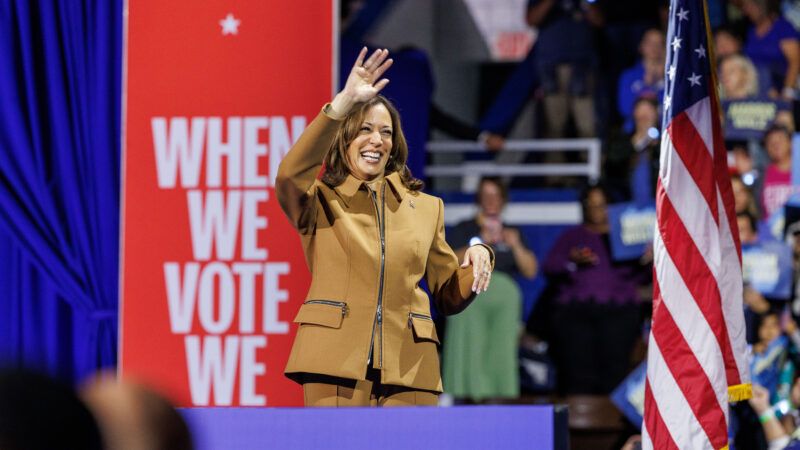Democrats Changed Candidates but Didn't Shift Their Message
Kamala Harris' closing pitch to voters is exactly the same one Joe Biden had been making.

When Vice President Kamala Harris delivers a speech on Tuesday from the National Mall in Washington, she'll be aiming to draw a direct parallel with former President Donald Trump, who stood on the same spot to address his supporters on January 6, 2020.
She might inadvertently underline her own struggles as the Democratic nominee.
The speech is being framed as Harris' "closing argument" to voters as the campaign rolls into its final week, but it will have a familiar ring to it. The Associated Press says Harris' campaign is hoping the speech will "crystalize for voters the fight between defending democracy and sowing political chaos." It will likely end up sounding a lot like the speech President Joe Biden delivered from Philadelphia in September 2022, which effectively served as the kickoff for his reelection bid.
Trump's threat to democracy became the dominant theme of Biden's campaign, until it came to a screeching halt this summer. When Harris ascended to the top of the ticket, Democrats made an attempt to differentiate her from Biden. Her campaign was about "joy," we were relentlessly informed during the Democratic National Convention. It was turning a page, not looking back, going forward.
Yet, here in the final stretch of the campaign, Harris finds herself not embracing joy but pushing fear. This reversion underlines Harris' inability to define herself and her campaign.
Of course, Trump's authoritarian impulses and his reaction to losing the 2020 election were always going to be a big part of any Democratic campaign against him. Trump's history of subverting the Constitution, and his threats to do so again if returned to the White House, ought to be taken both seriously and literally.
Still, making this Harris "closing pitch" seems telling. It's a choice that was already on display during a town hall event in Philadelphia last week, where Harris struggled to articulate her positions without veering into tangents about Trump's behavior.
"Would she expand the Supreme Court? Would people who make $500,000 see their taxes increase? Would Americans pay for benefits for migrants crossing the border?…Her answers boiled down to: Donald Trump would be worse," The New York Times summarized after the event.
Again, this says more about Harris than it does about Trump. She did not have the chance to run a typical campaign, it's true, but Harris has had months to stake out her positions. Instead, her campaign has spent much of that time backing away from unpopular stances she took during the 2020 primaries.
She's also failed to articulate any difference between herself and Biden. Asked directly about where she differs from him during an appearance on The View earlier this month, Harris appeared surprised by the very premise of the question.
Running as the continuation of the status quo might make sense if Biden had been forced to step down because of health issues despite being wildly popular and leading in the polls. But Biden's approval rating was underwater for most of his time in office and he seemed to be trailing Trump when he dropped out in July. Harris' campaign has reportedly sidelined Biden during this crucial final stage of the race, a sign that he's seen as a liability more than anything else.
And yet there's nothing she would do differently?
Think about this another way. Voters know what Trump wants to do—crack down harshly on immigration, raise barriers to trade, etc.—but what is it that Harris most wants to accomplish? How is it possible that Trump has become the more policy-centered candidate in this race?
It may also be a strategic mistake. If all the talk about Trump as a threat to democracy has not definitively swung the needle in Harris' favor yet, why would one more speech accomplish much? Voters have heard this argument for two years, and have presumably already made up their minds whether to vote against Trump on those grounds.
Yet, those grounds—literally and metaphorically—are where Harris will make her final pitch to voters. Having failed to make much of an affirmative case for herself, it's probably her best bet.


Show Comments (96)